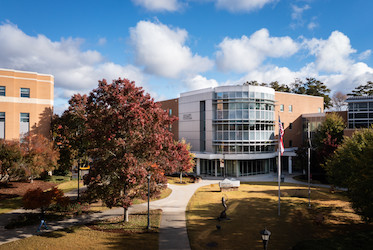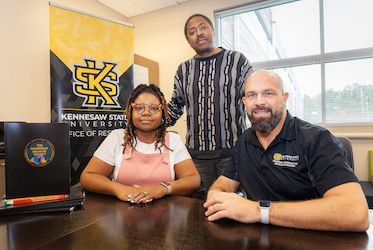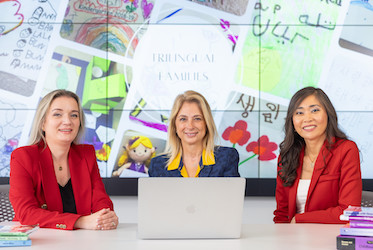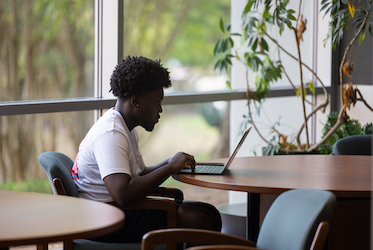
Designed to Share
KENNESAW, Ga. | Sep 1, 2017
Metro educators explore groundbreaking UDLab
A wave of recent workshops and visits to Kennesaw State University’s Universal Design for Learning Laboratory and model classroom represent the evolution of the Bagwell College of Education’s innovative thinking, penchant for collaboration and commitment to community engagement.
More than 800 visitors have flocked to the lab to explore cutting-edge practices and assistive technologies that facilitate successful learning, especially for those who have disabilities or diverse learning needs.
“Sharing this wonderful resource with educators across the region is a logical evolution for the Bagwell College’s efforts to make education accessible and inclusive for all learners,” said Joya Carter-Hicks, an associate professor in the Department of Inclusive Education and the lab’s lead coordinator of assistive technology. “We have been so fortunate to be able to partner and collaborate with the technology industry, with so many units across campus and with organizations in the disability and inclusion arena to create this lab and make it available and accessible.”

Joya Carter-Hicks, associate professor of special education, right, and Jayoung Choi, associate professor of TESOL, examine technology in the Universal Design for Learning Laboratory.
Established in summer 2016, the lab was initially designed as a model classroom where teacher candidates could see the potential of technology to facilitate learning. Its founder, Jill Williams, then a lecturer in the Department of Inclusive Education, envisioned it as a way to illustrate that there was more than one way for struggling students to access a curriculum.
Through a series of collaborations and funding from software companies, and the construction of the Bagwell College’s new Education Building in 2015, the classroom has been upgraded to become a functional Universal Design for Learning lab. It houses more than 60 technologies, applications and devices to make learning easier. The lab’s resources range from low-tech, clear colored overlay sheets that make it easier to read to the latest three-dimensional computer-simulated learning environments using virtual reality headsets.

LaTonya Simmons of Atlanta Public Schools, left, and Lexia Learning's Catherine Bunch try out the Coin-u-lator, a hand-held coin counting calculator.
In addition to being a resource for pre-service and in-service teachers, the lab serves as a critical resource for student interns of Kennesaw State’s Academy for Inclusive Learning and Social Growth and for other students who struggle with learning. Increasingly, it is being shared with the local educational community.
“Many of the lab’s visitors have been educators coming to explore high-leverage practices that blend assistive technology and Universal Design for Learning to support personalized instruction for students, whether English language learners, students with disabilities and/or students served in accelerated or inclusive education programs,” Carter-Hicks said.
On Aug. 25, representatives of the Marietta, Atlanta, Fulton, Fayette, Gwinnett, Paulding, Catoosa, Whitfield and Paulding school districts participated in a workshop demonstrating how assistive technology can help teachers of English learners. The workshop was a collaboration between the Kennesaw State Department of Inclusive Education’s Teaching English as a Second Language (TESOL) program, the State Department of Education and the Georgia Metropolitan Regional Educational Service Agency.
Workshop participants heard an overview of universal design for learning, a concept developed from the universal design approach to architecture, which made accessibility a central component of design. Carter-Hicks, along with Helen Maddox, a KSU instructional technology coach, and Pat Satterfield of Georgia Tools for Life at Georgia Tech, demonstrated some of the lab’s assistive technology tools, including Kurzweil 3000, a software program that helps improve literacy for people struggling with reading and writing, and new commercially available software like Microsoft Office Lens, which can turn any text into spoken language. Catherine Bunch, an account executive for Rosetta Stone’s Lexia Learning, demonstrated the Core 5 personalized reading learning software, which the company recently donated for use in the UDLab.

“The UDLab is a fabulous resource,” said Gwinnett County Schools’ Elizabeth Webb, who indicated a desire to schedule a time to return and bring the district’s ESOL Teacher leaders. “There is such high potential here for assisting teachers in making content more comprehensible and accessible for students. This could be especially useful for low-density EL schools where teachers need additional support providing the appropriate instruction.”
In addition to the workshop, the lab has recently hosted or partnered with ATMetro, a consortium of assistive technology coordinators across metro Atlanta, as well as Georgia Leadership and Education in Neurodevelopmental Disabilities (GaLEND), an interdisciplinary training program Georgia State University operates through its Center for Leadership in Disability. Engagement with GaLEND has expanded the UDLab’s reach to the organization’s collaborators, which include the Satcher Health Leadership Institute at Morehouse School of Medicine (MSM) and the Centers for Disease Control and Prevention’s National Center on Birth Defects and Developmental Disabilities.
“These and other community partners offer the expert faculty and resources necessary to provide exceptional interdisciplinary training and services in the lab,” said Carter-Hicks, who was designated a 2016-2017 Governor’s Teaching Fellow to research innovative ways of bringing technology into the classroom.
In October, the UDLab will a host a half-day assistive technology workshop at the Diversability Conference, the University’s first expo/conference to focus on universal design and education as a means to empower people of all abilities. The conference is hosted by Kennesaw State’s Presidential Commission on Disability Strategies and Resources in coordination with the Georgia Vocational Rehabilitation Agency.
“New opportunities are being created every day to collaborate, partner and share this lab with our students and the community,” Carter-Hicks said. “And that has always been an important part of its mission.”
# # #
—Sabbaye McGriff
Photos by David Caselli; Video by Paul Floeckher
Related Stories

Kennesaw State first in Georgia to offer master's in teacher and educational leadership

Kennesaw State receives $2.5 million grant to foster student success in calculus

Kennesaw State research aims to preserve language and culture in trilingual homes

Kennesaw State researcher explores new way to use AI for student teachers
A leader in innovative teaching and learning, Kennesaw State University offers undergraduate, graduate and doctoral degrees to its more than 45,000 students. Kennesaw State is a member of the University System of Georgia with 11 academic colleges. The university’s vibrant campus culture, diverse population, strong global ties and entrepreneurial spirit draw students from throughout the country and the world. Kennesaw State is a Carnegie-designated doctoral research institution (R2), placing it among an elite group of only 7 percent of U.S. colleges and universities with an R1 or R2 status. For more information, visit kennesaw.edu.















